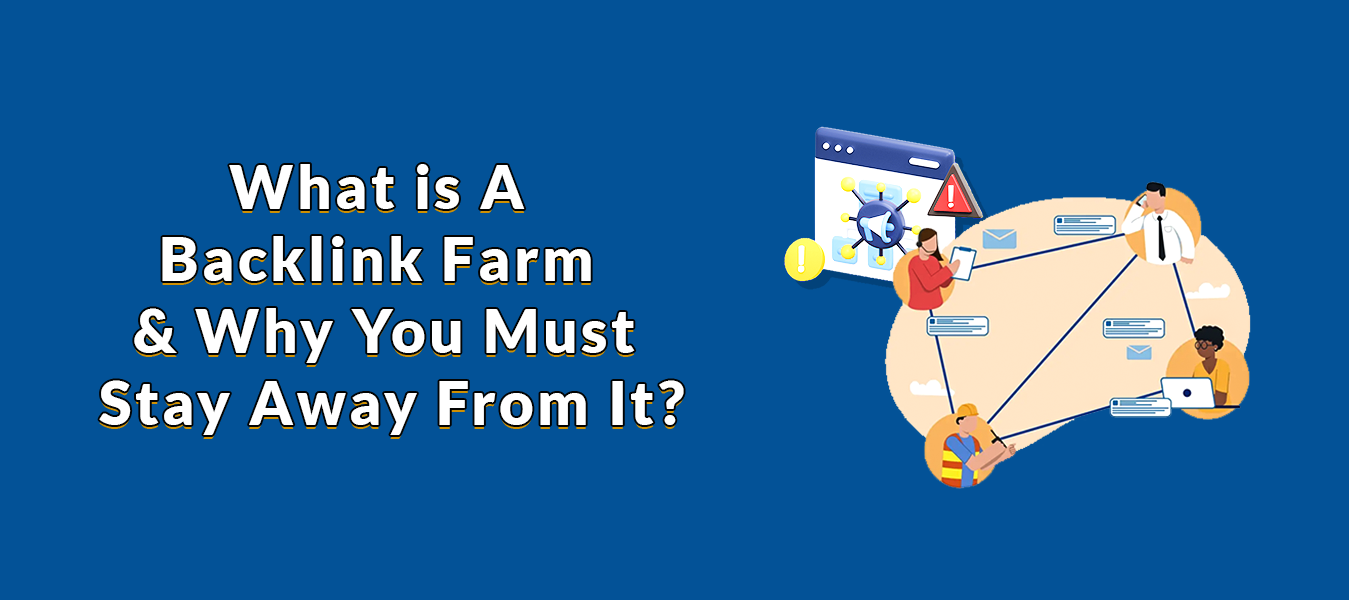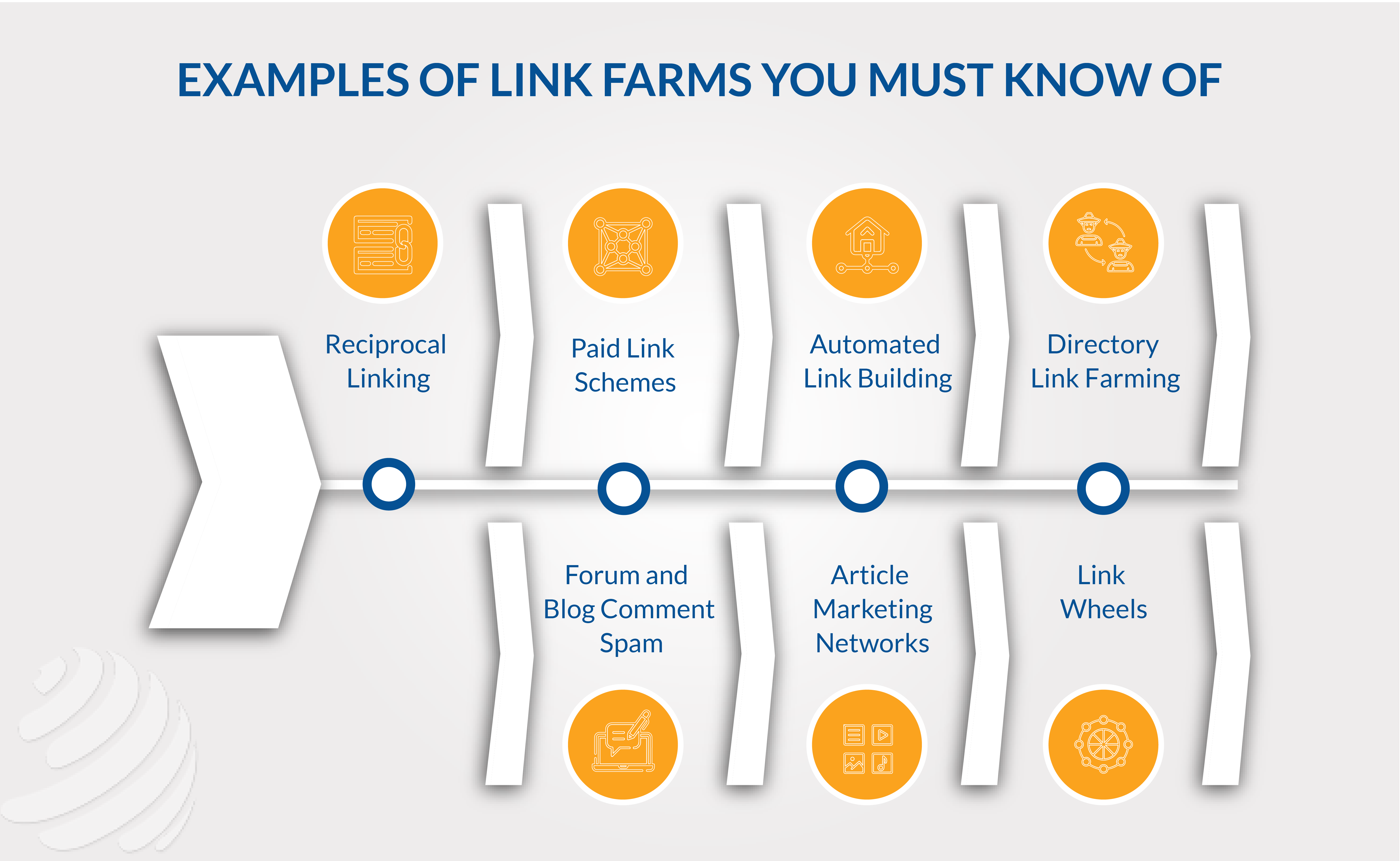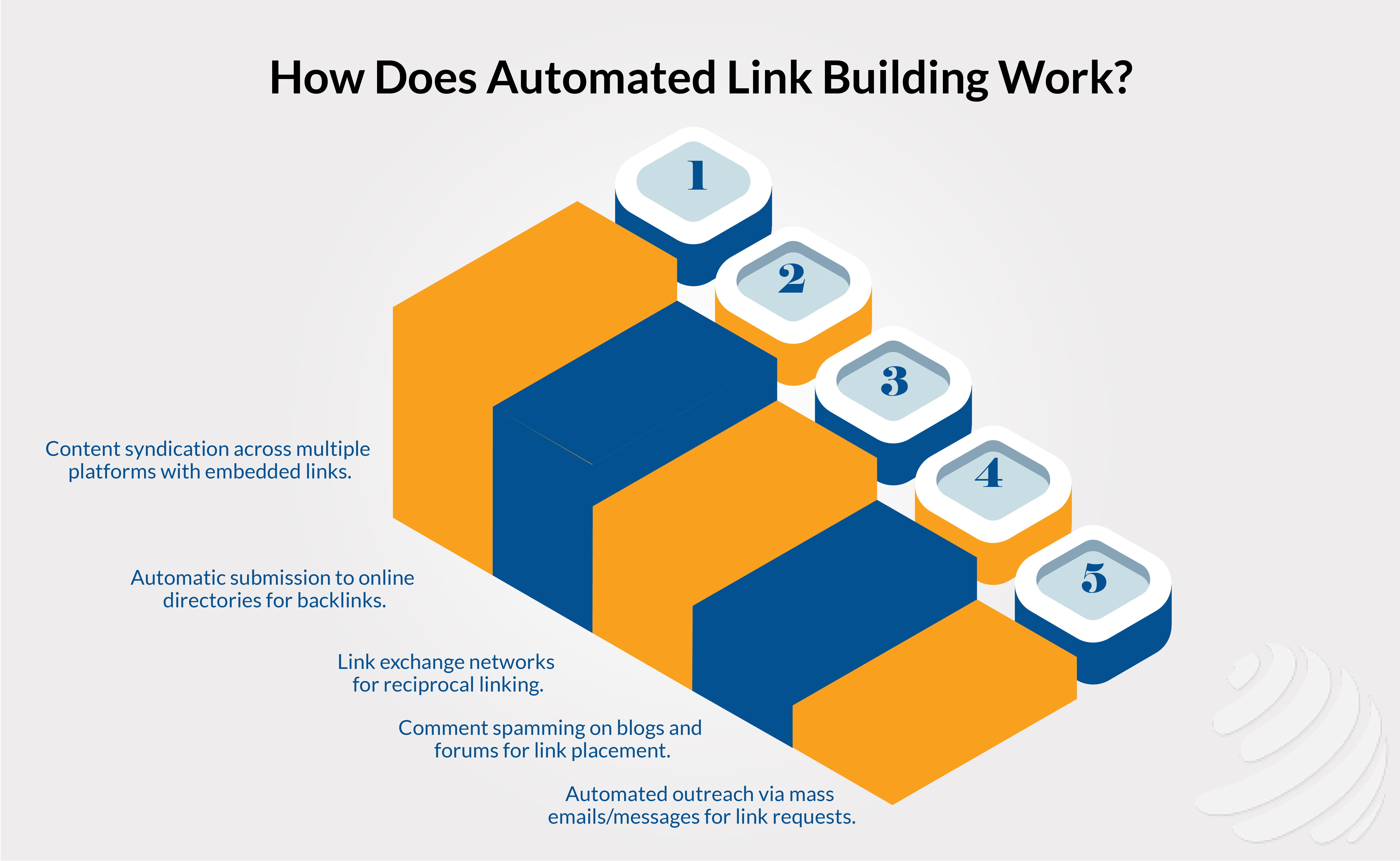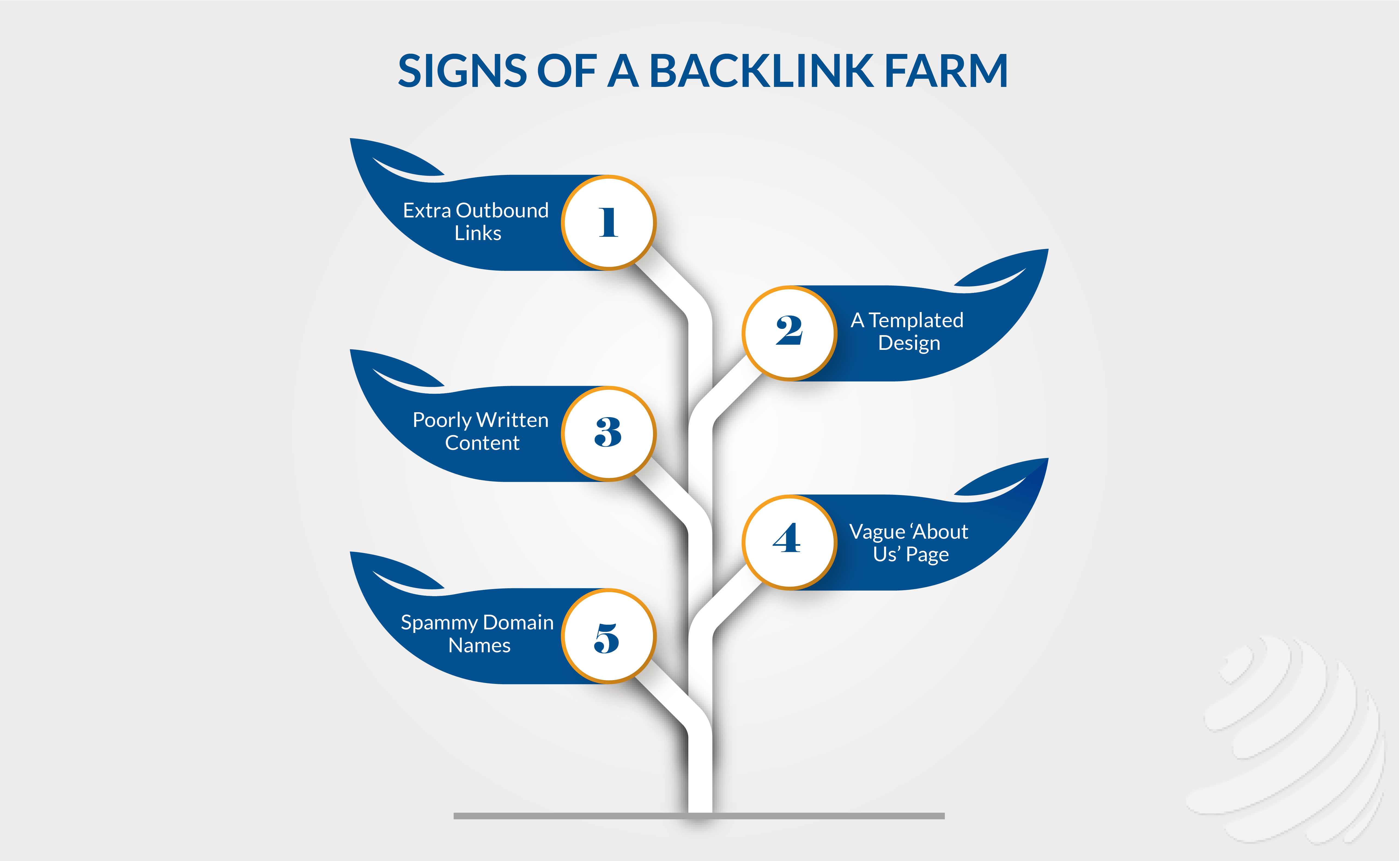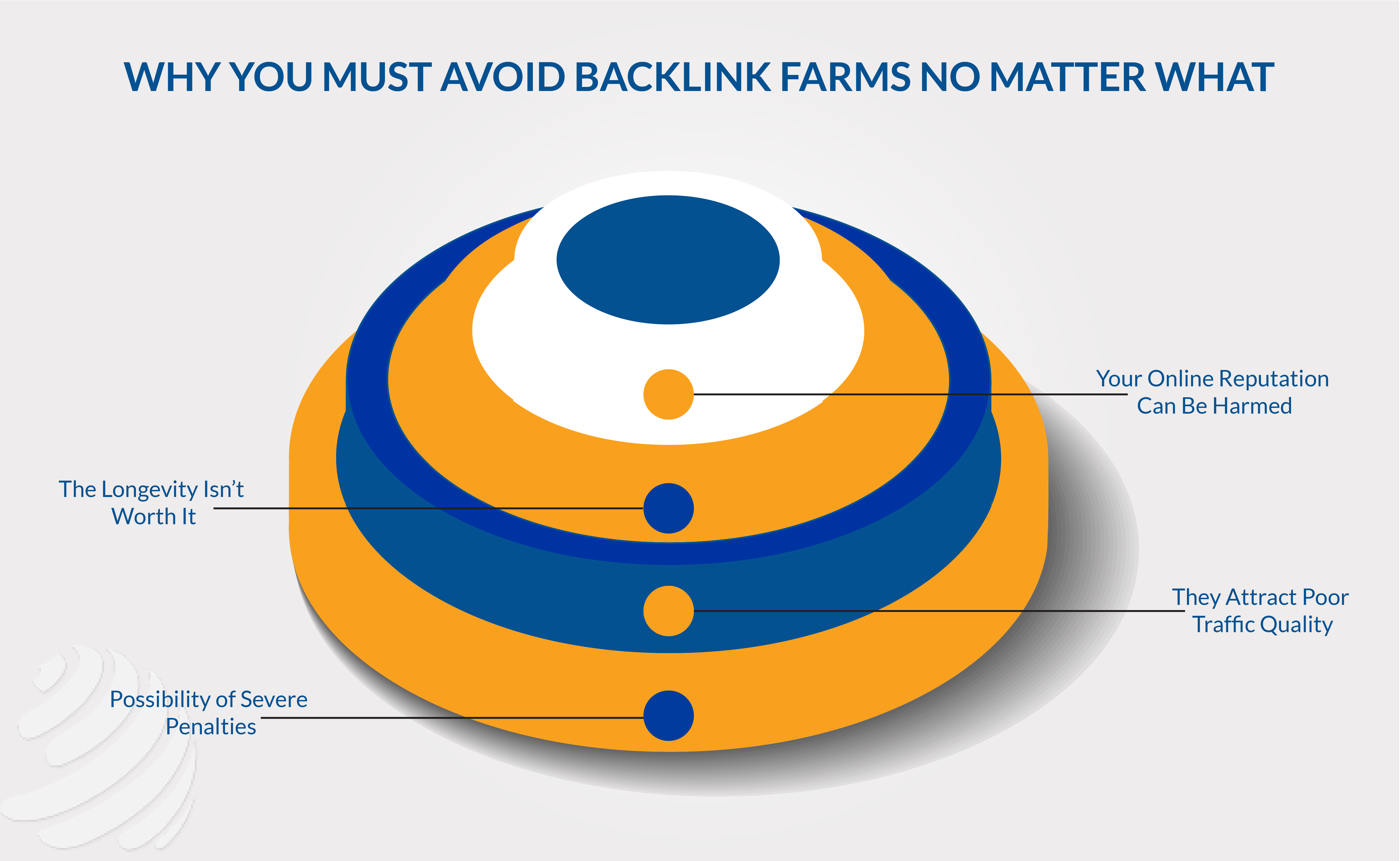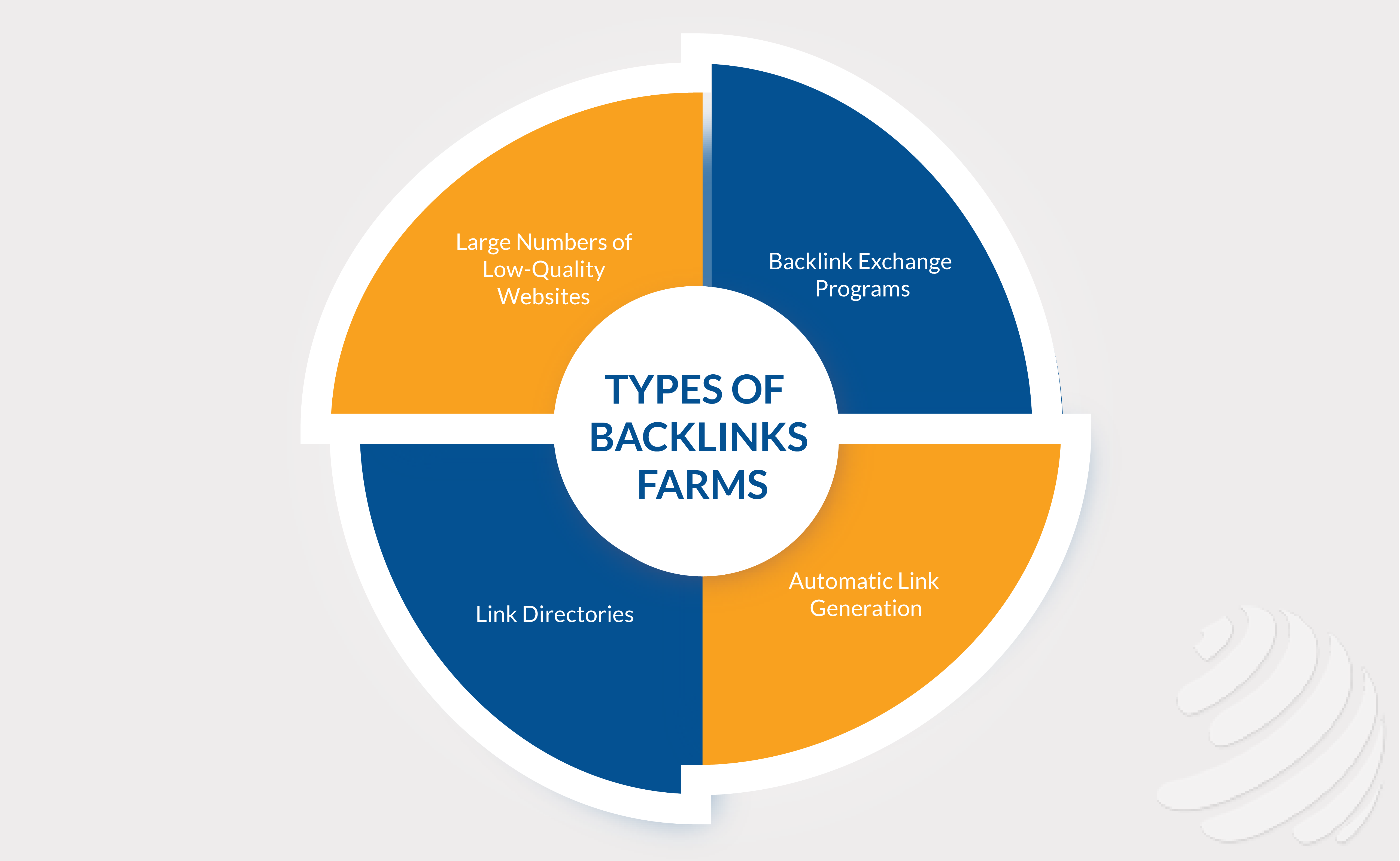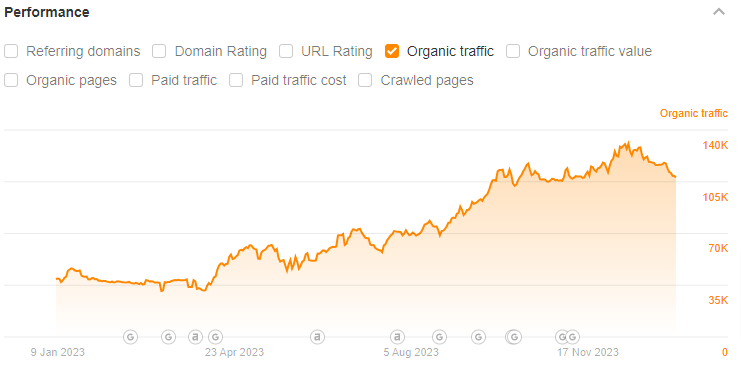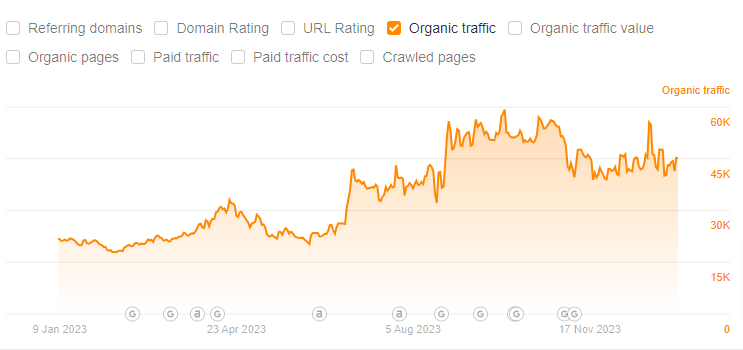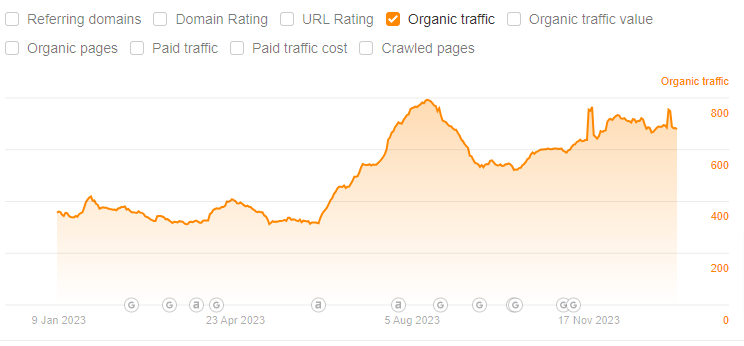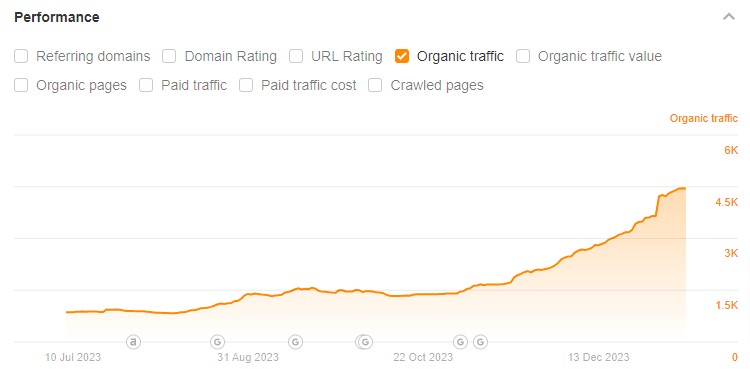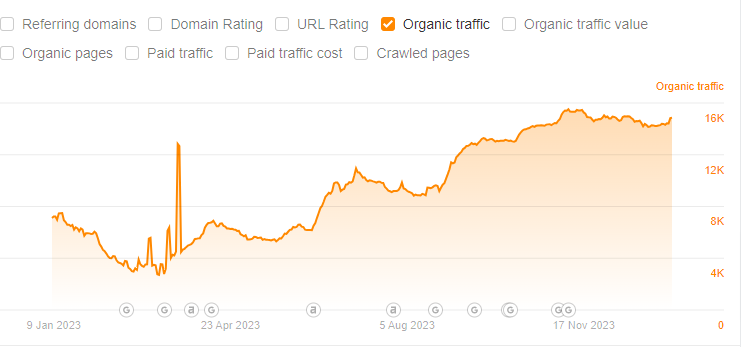A backlink farm is the biggest red flag in the world of Search Engine Optimization.
Let’s start with that.
Given the speed and relative affordability, a backlink farm can appear as a good choice for developing an incoming link network. However, link farms are regarded as cheating because Google’s page ranking algorithm gives links a lot of weight.
Therefore, even though SEO farms could appear like a simple way to improve your marketing results, it might not be worth it given the possible drawbacks.
Let’s learn more:
What Is Link Farming?
Link farming meaning the activity of websites or persons creating a huge number of backlinks leading to their own website or to each other, is just an effort to influence search engine rankings. These links are usually spammy, of low quality, or placed on websites with the express intent of artificially raising the target site(s)’s search engine rating.
In the early days of search engine optimization (SEO), link farms were more prevalent because search engines largely used the number of links pointing to a website as a gauge of its popularity and relevance. But as search engines have advanced, so have their algorithms, which are now able to identify and penalize a backlink farm as well as link farming.
Websites that participate in link farming or create SEO farms are now penalized by search engines like Google, which either lower their rankings or remove them completely from search results. It is essentially regarded as a black hat SEO strategy, which means that it tries to artificially manipulate search engine rankings rather than offering users actual value.
It also violates search engine guidelines. Therefore, you must stay away from indulging in any practice that leads to a backlink farm.
Link Farms Examples
Now that you know what is link farming, let’s dig deeper into a backlink farm.
What is the best way to learn more about link farming?
By studying link farms examples!
So, let’s take a look:
Reciprocal Linking
Reciprocal linking is the artificial exchange for backlinks and is our first example of a backlink farm. It involves websites mutually agreeing to exchange links with each other, often without regard for relevance or content quality. Websites may engage in reciprocal linking solely to boost their search engine rankings through increased backlink counts.
Why do people do it?: Website owners engage in reciprocal linking to artificially inflate their link profiles, believing that a higher number of backlinks will positively impact their search engine rankings.
How effective is it?: Studies, such as the one conducted by Moz, reveal reciprocal linking as one of the least effective link building tactics, with its effectiveness rated very low, at only 2.26 out of 10.
Paid Link Schemes
Paid link schemes involve the buying and selling of links with the explicit intention of manipulating search engine rankings. Links are often placed on irrelevant or low-quality websites or SEO farms, bypassing the natural process of earning backlinks through valuable content.
Why do people do it?: Websites resort to paid link schemes in hopes of quickly and artificially boosting their search engine rankings without investing time and effort in creating high-quality content or engaging in genuine outreach.
What is the risk of using this method to create a backlink farm?: Such practices violate search engine guidelines, risking penalties that can significantly harm a website’s visibility and credibility in search results.
Automated Link Building
Mass generation of low-quality links AKA automated link building involves using software or bots to create a large volume of links across various online platforms, including websites, forums, blogs, and comment sections. These links are typically of low quality and lack relevance.
How does it work?: Automated tools enable website owners to generate links en masse, bypassing the need for genuine engagement, content creation, or editorial review.
What are the repercussions?: Search engines are adept at detecting and penalizing websites engaged in automated link building, often resulting in decreased search engine rankings or outright removal from search results.
Directory Link Farming
Directory link farming entails submitting a website to numerous online directories primarily to obtain backlinks. These directories may lack relevance or quality, Moreover, the links acquired from such a backlink farm often provide minimal value to users.
Why do people do it?: Website owners engage in directory link farming to artificially inflate their backlink profiles, believing that a higher quantity of links will positively impact their search engine rankings.
How effective is it?: Research, such as that conducted by SEMrush, suggests that directory submissions are among the least effective link building tactics, with a low effectiveness rating.
Forum and Blog Comment Spam
Forum and blog comment spam involves posting irrelevant or low-quality comments on online forums, blogs, or social media platforms solely to include links back to a target website. These comments contribute little or no value to the discussion.
Why do people do it?: The primary aim of using forum and blog comment spam to create a backlink farm is to manipulate search engine rankings by artificially increasing the number of backlinks pointing to a website.
What are the repercussions?: Search engines penalize websites engaged in comment spamming, recognizing it as a manipulative tactic that undermines the integrity of online discussions and search results.
Article Marketing Networks
Article marketing networks involve participating in networks where low-quality articles are published across multiple websites solely to include links back to the author’s website. These articles may be duplicated or spun to create the illusion of unique content.
Why do people do it?: Website owners leverage article marketing networks to generate backlinks in bulk, disregarding the importance of producing high-quality, original content that genuinely adds value to readers.
How effective is it?: Research indicates that article marketing is among the least effective link building tactics, with its effectiveness rated low compared to other strategies.
Link Wheels
Link wheels, another example of a backlink farm, entail creating a network of websites or web pages that link to each other in a circular pattern, with the aim of passing link authority to a central website. This tactic is aimed at artificially inflating the search engine ranking of the central site.
What is the structure?: The link wheel structure involves interconnecting websites or web pages through a series of reciprocal links, with each site in the network supporting the others to manipulate search engine algorithms.
What are the repercussions?: While specific statistics on link wheel effectiveness may be scarce, SEO experts widely acknowledge their manipulative nature, highlighting the risk of penalties from search engines for engaging in such practices.
How to Identify a Backlink Farm?
How can you tell if what you are looking at is a backlink farm?
Let us tell you:
Extra Outbound Links
Link farms frequently use a large number of outbound links to manipulate search engine rankings. Make sure a website has a respectable amount of linked sites to avoid link farming. You can use SEO tools such as Ahrefs for determining the quantity of links that a website has.
A Templated Design
SEO farms typically don’t invest a lot of effort or resources in the design of their websites. They frequently make minor adjustments to a basic page design that their hosting platform offers. On the other hand, superior websites usually feature a personalized layout that enhances the overall interaction with the user.
Poorly Written Content
A backlink farm does not prioritize high-quality content. A website is more likely to engage in link farming if the information it provides is ill-researched and irrelevant. Additionally, original content is uncommon on these websites.
Vague ‘About Us’ Page
There is usually not much information on “about pages” for link farms. It’s improbable that you’ll locate the website owner or their information. In most cases, a contact page will just serve as a means of contacting someone regarding link purchases.
Spammy Domain Names
You may come across websites with odd domain names when browsing, frequently stuffed with meaningless keywords. These domain names are referred to as spammy. This tactic is widely used by link farms, which create domain names that have no obvious connection to their content.
SEO farms frequently use irrelevant, spammy domain names, which adds to their lack of legitimacy. These websites could negatively impact your SEO metrics, so be cautious.
Why Do You Need to Steer Clear of Backlink Farm and Link Farming?
Okay, but why is link farming harmful to your website?
A backlink farm is dangerous, and here are all the reasons why you must avoid it at any cost:
Your Online Reputation Can Be Harmed
Your site’s backlink profile is quite important, so the links you choose are also very important. When your website is linked to a backlink farm, its reputation plummets. Nowadays, users are more familiar with the internet and can verify the reliability of the websites you link to.
It casts doubt on the reliability of your website if they discover that you are selling links or linking to unrelated websites. Over time, this negative impression lowers user engagement and thus lowers traffic.
The Longevity Isn’t Worth It
There’s no assurance that links from a backlink farm will stay live for the long term, even if the link farm owner maintains a tight enough operation to escape closure or punishment. All those backlinks you paid for could abruptly vanish because SEO farms frequently collapse as abruptly and rapidly as they arise.
Furthermore, even if a backlink farm is still operational, there is no assurance that the links you specifically provide won’t be updated or removed at any time. Besides, ranking algorithms are dynamic.
For example, Google is now developing quality control enhancements that will more accurately evaluate the lifetime of the connection and the reputation of the link source to ascertain its actual value.
So, are link farms worth it?
No.
In fact, it is only a matter of time before they completely disappear from the internet.
They Attract Poor Traffic Quality
Not only is quantity important when it comes to website visitors, but quality is as well.
Although they may guarantee more inbound links, link farms frequently draw in low-quality visitors. Because they are interested in something other than your services, audiences from these websites typically have high bounce rates and low time-on-page metrics.
On the other hand, links from reputable websites would draw in interested users and greatly enhance your analytics as well.
Possibility of Severe Penalties
Links of poor quality, such as those originating from link farms, can cause serious penalties for your website that will be challenging to recover from. This holds true for both backlinks going to your website and outbound links that you add to your content.
Usually, an algorithm filter is used to automatically apply such penalties. On the other hand, Google spam team members occasionally choose to manually check websites for possible infractions of their webmaster guidelines and impose a penalty.
In addition to that, a competitor could report your website to Google for spamming, which could also result in penalties. You won’t receive a formal notification if this occurs, but your website traffic and search engine rankings will noticeably decline.
The suspected penalty is also not subject to appeal. The only thing left to do is conduct a thorough assessment of your website, address any problems, and keep your fingers crossed.
Backlinks Farm Types
A backlink farm can be found in a diverse array of structures.
However all backlinks farm types have some common elements. Those elements are:
Large Numbers of Low-Quality Websites
Many websites unrelated to the link farm’s content are frequently included in link farms. These websites might already be up and have been invited to join the link farm, or they might have been made expressly with the intention of taking part in the backlink farm.
Backlink Exchange Programs
Link exchange setups and other reciprocal linking arrangements can be employed by link farms to simulate a vast and well-known network. In order to be a part of the backlink farm, these programs could demand participant websites to connect to one another.
Link Directories
SEO farms can simulate a big and well-known network by using link directories or other kinds of lists of links. Regardless of the importance of the links in these directories, they may lead to a variety of websites.
Automatic Link Generation
Some link farms may create links between websites by using automated tools, giving the impression that the network is vast and well-known. These links could be hard for users to browse, irrelevant, and of poor quality.
Why Do SEO Farms Have High DA?
We all know that SEO farms are bad.
But why is it that every time we come across a backlink farm, it has a really impressive Domain Authority (DA)?
Do not let yourself be duped by SEO stats into believing that a particular website is worthwhile to target in your outreach efforts to acquire links.
Link farms typically feature low-quality content, although SEO tools will frequently indicate that their authority score is high. SEO farms are also more often than not built on high authority domains for a variety of reasons.
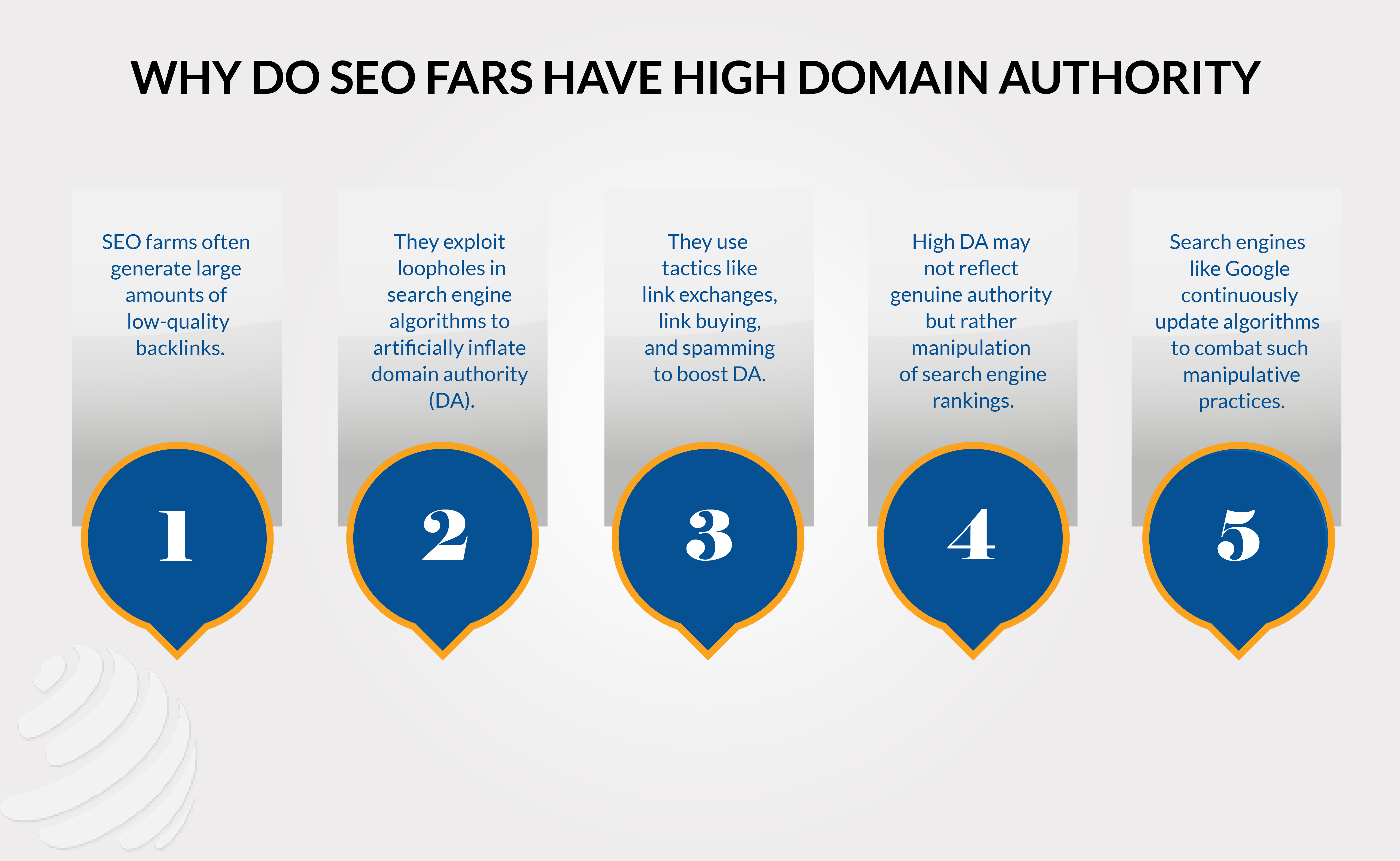
Well, such a website can be:
- Built upon a high DA domain that had expired.
- A formally authoritative website that has been neglected after providing value in the past.
- A portion of a PBN that has its domain metrics artificially raised.
Although this isn’t displayed in SEO tools’ domain authority rankings, Google’s ranking algorithms typically identify spammy websites and provide them with a lower rating.
This implies that even if the website has strong domain metrics, you should still stay away from it since it will lower rather than raise the page rank of your website.
Backlink Farm FAQs
What is a backlink farm?
A backlink farm, also known as a link farm, is a collection of websites or web pages created solely to host hyperlinks aimed at artificially boosting the search engine rankings of other websites. These links are often low-quality, irrelevant, and manipulated to deceive search engine algorithms.
How do backlink farms operate?
Backlink farms operate by indiscriminately generating or hosting large numbers of links to target websites. They may engage in practices such as reciprocal linking, paid link schemes, automated link building, and other manipulative tactics to artificially inflate link counts.
Are backlink farms effective for improving search engine rankings?
While backlink farms may temporarily boost search engine rankings through increased link quantity, they are not effective for long-term success. Search engines, such as Google, have sophisticated algorithms that detect and penalize manipulative link schemes, ultimately leading to decreased rankings or removal from search results.
What are the risks associated with link farms?
Engaging in link farming practices poses significant risks to websites, including penalties from search engines. These penalties can result in decreased visibility, loss of organic traffic, and damage to a website’s reputation and credibility.
How can I identify if my website is involved in an SEO farm?
Signs that your website may be involved in an SEO farm include sudden spikes in backlink quantity from low-quality or irrelevant websites, patterns of reciprocal linking with unrelated sites, and an unnatural anchor text distribution in your backlink profile.
What are the consequences of being associated with backlink farms?
Websites associated with backlink farms may face severe consequences, including decreased search engine rankings, manual penalties, and even removal from search engine results. Additionally, being associated with manipulative link schemes can tarnish a website’s reputation and credibility.
How can I avoid link farms and maintain a healthy backlink profile?
To avoid link farms, focus on earning high-quality backlinks through genuine means, such as creating valuable content, engaging with your audience, and participating in relevant online communities. Conduct regular backlink audits to identify and disavow any spammy or manipulative links pointing to your site.
What should I do if my website has been penalized for involvement in a backlink farm?
If your website has been penalized for involvement in a backlink farm, take immediate action to remove or disavow any unnatural or manipulative links. Submit a reconsideration request to the respective search engine after addressing the issues and implementing corrective measures to regain your website’s visibility in search results.
Conclusion
Building links is a crucial component of SEO, but it must be done correctly. You might feel inclined to engage in link farming because a lot of search engines evaluate inbound links to determine rankings. Link farming, on the other hand, is a black-hat SEO tactic that might get you penalized by these search engines and their algorithms.
Links can be built by broken link building, resource page link building, guest blogging, and link baiting, among other white-hat techniques, if you want to increase your link profile and improve your position in Google’s ranking algorithm. You’re more likely to earn high-quality links from these techniques and avoid penalties instead of turning to a backlink farm.


